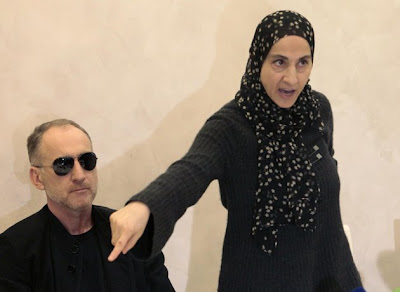The father of the two Boston bombing suspects said Thursday that he is soon leaving Russia for the United States, to visit one son and lay the other to rest. Their mother said she was still thinking over whether to make the journey.
"I am going there to see my son and bury my older one," Anzor Tsarnaev said in an emotional meeting with journalists. "I have no bad thoughts, I'm not planning any bombings, I don't want to do anything. I'm not offended by anyone. I want to know the truth, what happened. I want to work it out."
Tamerlan Tsarnaev, 26, was killed in a gun battle with police, while his 19-year-old brother, Dzhokhar Tsarnaev, remains hospitalized with gunshot wounds.
Their parents returned last year to Dagestan, one of several predominantly Muslim provinces in southern Russia, where the family lived briefly before moving to the U.S. a decade ago.
The elder suspect spent the first half of 2012 in Russia's Caucasus, which has been ravaged for years by an insurgency led by religious extremists. Anzor Tsarnaev said his son stayed with him for at least three months in Makhachkala, the capital of Dagestan, and spent one month with relatives, but he was unclear on where his son was for the remaining time.
U.S. investigators have been trying to determine whether Tamerlan Tsarnaev was radicalized during his stay in the Caucasus, where he regularly prayed at a Makhachkala mosque.A team of investigators from the U.S. Embassy in Moscow has questioned both parents in Makhachkala this week, spending many hours with the mother in particular over the course of two days. Tsarnaev said the questions were mostly about their sons' activities and interests.
The father, who wore dark aviator sunglasses during Thursday's news conference, said he was leaving "today or tomorrow" for the United States. But the family later said his travel may be delayed because he was not feeling well.
The suspects' mother, Zubeidat Tsarnaeva, who was charged with shoplifting in the U.S. last summer, said she has been assured by lawyers that she would not be arrested, but said she was still deciding whether to go.
Tsarnaeva, wearing a headscarf and dressed all in black, said she now regrets moving her family to the U.S. and believes they would have been better off in a village in her native Dagestan.
"You know, my kids would be with us, and we would be, like, fine," she said. "So, yes, I would prefer not to live in America now! Why did I even go there? Why? I thought America is going to, like, protect us, our kids, it's going to be safe."
Russian President Vladimir Putin said Thursday that the Boston bombings should spur stronger security cooperation between Moscow and Washington, adding that they also show that the West was wrong in supporting militants in Chechnya.
"This tragedy should push us closer in fending off common threats, including terrorism, which is one of the biggest and most dangerous of them all," Putin said during his annual call-in show on state television.The Russian government contacted first the FBI and then the CIA in 2011 with concerns about Tamerlan Tsarnaev, U.S. officials said. The FBI said it had asked for more information from Russia, but none was provided.
Putin said Thursday that the Russian special services had no information to give because the Tsarnaevs had spent so little time in Russia.
Putin warned against trying to find the roots for the Boston tragedy in the suffering endured by the Chechen people, particularly in mass deportations of Chechens to Siberia and Central Asia on Soviet dictator Josef Stalin's orders. "The cause isn't in their ethnicity or religion, it's in their extremist sentiments," he said.
The suspects are ethnic Chechens and their father's family was deported to Central Asia in the 1940s. The Tsarnaev family moved back to Chechnya in the early 1990s, but soon fled back to Kyrgyzstan after fighting broke out between Chechen separatists and Russian troops, whose bombs and artillery pummeled Chechen cities and town.
Putin criticized the West for refusing to declare Chechen militants terrorists and for offering them political and financial assistance in the past.
"I always felt indignation when our Western partners and Western media were referring to terrorists who conducted brutal and bloody crimes on the territory of Russia as rebels," Putin said.
The U.S. urged the Kremlin to seek a political settlement in Chechnya and criticized rights abuses by Russian troops during the two separatist wars. It also provided humanitarian aid to the region during the fighting in the 1990s and early 2000s.
Russian officials have claimed that rebels in Chechnya have close links with al-Qaida.
Putin said the West should have cooperated more actively with Russia in combatting terror.
"We always have said that we shouldn't limit ourselves to declarations about terrorism being a common threat and engage in closer cooperation," he said. "Now these two criminals have proven the correctness of our thesis."
___



